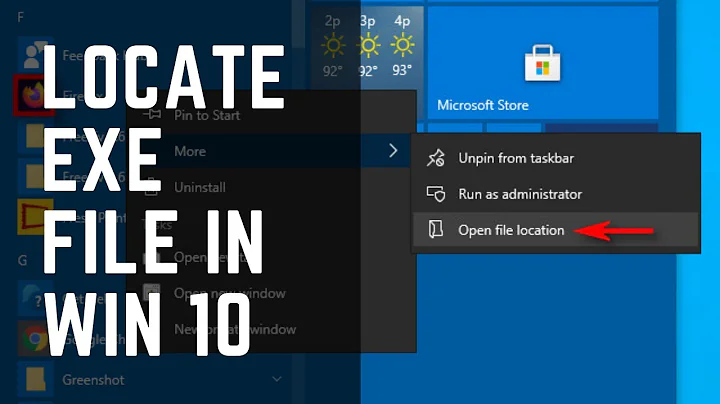How to find executable filetypes?
Solution 1
Later edit: only this one does what jan needs: thank you huygens;
find . -exec file {} \; | grep -i elf
Solution 2
Alternate solution not using file and readelf, for those on limited (e.g. embedded) systems:
find $WHERE -type f -exec hexdump -n 4 -e '4/1 "%2x" " {}\n"' {} \; | grep ^7f454c46
Basically, we output first four bytes with hexdump and use them as a signature. We can then grep all the files of type ELF using its signature 7f454c46.
Or, since 7f is the delete character, and 45, 4c, 46 bytes are E, L, F characters respectively, we could also use:
find $WHERE -type f -exec hexdump -n 4 -e '4/1 "%1_u" " {}\n"' {} \; | grep ^delELF
Also, you can use head instead of hexdump in this case:
find $WHERE -type f -exec head -c 4 {} \; -exec echo " {}" \; | grep ^.ELF
Solution 3
Like others, I want to answer too. My answer is based on using the find utility too, but I have an idea, which is differ against other answers. It grounded on that fact, that the -exec can be used as the search criteria too. Now, having this thing in mind, we can refactor all of the previous proposals to this one:
find /path -type f -exec sh -c "file {} | grep -Pi ': elf (32|64)-bit' > /dev/null" \; -print
I.e. we have moved the grep into the -exec.
What does this give to us, you may ask? We can use the flexibility of the -print and others of the find utility. For example, we can format an output on our taste, or use the -print0 and redirect an output to some script etc.
Solution 4
Take a look on -executable flag of find.
Solution 5
I think this answers the original question if their intent was to find binary executable files by ensuring each match has an elf header.
It sort of pre-processes files based on type -executable then runs the results through a separate shell that invokes readelf -l which pipes to grep which silently matches on headers that are explicitly executable. Anything that passes this test is passed to printf for the output.
The pwd bit outputs the full path.
find `pwd` -type f -executable -exec sh -c 'readelf -l "$1" 2>/dev/null | grep -qio 'executable' && printf "$1\n"' -- {} \;
Related videos on Youtube
JohnnyFromBF
Updated on September 18, 2022Comments
-
JohnnyFromBF over 1 year
I want to find file types that are executable from the kernel's point of view. As far as I know all the executable files on Linux are ELF files. Thus I tried the following:
find * | file | grep ELFHowever that doesn't work; does anybody have other ideas?
-
JohnnyFromBF almost 12 yearsThat's not quite what I want, I don't want files that are tagged as executable files but I want to find ELF files, files that are recognized as executable by the kernel.
-
JohnnyFromBF almost 12 years
find . -exec file {} \; | grep -i elfis what I was looking for, thanks! -
Huygens almost 12 yearsThe flag executable match permissions (so directories too), see the man page:
Matches files which are executable and directories which are searchable (in a file name resolution sense). -
Huygens almost 12 yearsI think your first command doesn't work. It is searching for files with a name like "*elf *" (without taking into account the case). You want to grep the output just likeyou did in the second proposal.
-
 Waqas almost 12 years@huygens I tested it before I posted and it works. touch elf 1elf 1ELF2 elf2</code> ; my command will find all the elf related files;
Waqas almost 12 years@huygens I tested it before I posted and it works. touch elf 1elf 1ELF2 elf2</code> ; my command will find all the elf related files; -
 Waqas almost 12 years@huygens I tested it before I posted and it works. touch elf 1elf 1ELF2 elf2 ; my command will find all the elf related files (just like the grep); you got that error because you have copy pasted it (i think) and it has a blank space not needed, in the " " . but if I write "asteriskELFasterisk" in <code>, the html eats my asterisks!!!
Waqas almost 12 years@huygens I tested it before I posted and it works. touch elf 1elf 1ELF2 elf2 ; my command will find all the elf related files (just like the grep); you got that error because you have copy pasted it (i think) and it has a blank space not needed, in the " " . but if I write "asteriskELFasterisk" in <code>, the html eats my asterisks!!! -
 Waqas almost 12 years@huygens : you are write, my mistake. I did not understand well what ian needed, at first.
Waqas almost 12 years@huygens : you are write, my mistake. I did not understand well what ian needed, at first. -
Huygens almost 12 yearsActually my first answer is not fully correct, as some binary executable files are detected by
file -ias application/x-sharedlib and not application/x-executable. -
user unknown almost 12 years@Huygens: So directories are files (everything is a file on Unix), but to exclude them, just use
find -type f -executable. -
user unknown almost 12 years@Ian: But Shellscripts are executable by the kernel. Executable flag + appropriate shebang means executable file. Or flag + binary-elf, or flag + a.out, or flag + binfmt-patch.
-
Huygens almost 12 years@userunknown shell script aren't executable by the kernel. You need to run a shell and have the interpreter to execute them. As I understood Ian question, he is looking only for binary executable files. Thus
find -type f -executablewould not be correct as shell script would be reported. In addition if a binary does not have the x permission, this command would not detect it. Either it is wanted or not, both cases have different purpose. -
user unknown almost 12 years@Huygens: No, you can execute shell scripts with exec-calls, see: en.wikipedia.org/wiki/Shebang_%28Unix%29 . If there is a shebang, only the rest of the script is executed by the interpreter. Since 1980.
-
Huygens almost 12 years@userunknown interesting, didn't know that.
-
user2071406 about 10 yearsThe binaries I sampled from my Mac are
application/octet-stream; charset=binary, according to both the Mac'sfileand thefileon my Debian box. (Speaking of OS X, thefileit includes uses-Iinstead of-i. Both accept--mime, though.) -
Anthon almost 9 yearsDoesn't work on all files/paths
-
 John McGehee almost 8 yearsThis will find files that contain
John McGehee almost 8 yearsThis will find files that contain"elf"in their file name. I found that grepping for" elf "was good enough for my application, but in the most general case a file named"this is not elf .txt"would give a false positive. -
 Jason Stewart over 2 yearsThe
Jason Stewart over 2 yearsThegrepcommand could use the--textflag. Without it, some file headers have characters that will putgrepinto binary mode--which will suppress all further matches with thegrep: (standard input): binary file matchesmessage. -
Adam Badura about 2 yearsHow about using
$'\x7FELF'for the exact string to match?



![Can't Open EXE Files in Windows 11 [Exe File Not Opening]](https://i.ytimg.com/vi/jZHP95c2kEE/hq720.jpg?sqp=-oaymwEcCNAFEJQDSFXyq4qpAw4IARUAAIhCGAFwAcABBg==&rs=AOn4CLDKYsRf6mSgcymyvMq_DmKMktv3OA)
